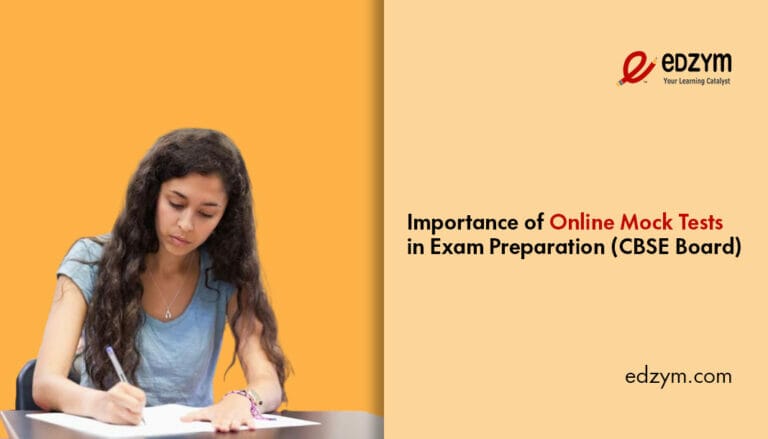Last Minute Tips to Score High in CBSE Board Exams (Class 10&12)
The CBSE board exams are one of the most crucial exams for students in India. These exams can have a significant impact on a student’s future, as they determine which stream of education they can choose and where they can pursue higher studies.
The CBSE exams are a testing ground for students to showcase their knowledge and abilities, and it is essential to prepare for them effectively. Preparing for the board exams can be a challenging task, and often students may feel overwhelmed by the vast syllabus and the pressure of performing well. However, with the right preparation strategy and last-minute tips, students can overcome these challenges and achieve their desired results.
In this blog, we will discuss some effective last-minute tips that students can follow to score high in CBSE board exams for classes 10 and 12. These tips are designed to help students optimize their preparation and approach the exams with confidence.
Last Minute Tips for CBSE Board Exams
Revise Your Syllabus
Revising the syllabus before appearing for board exams is one of the most important steps that students can take to ensure success. It is the final step in preparing for the exam and helps to consolidate the knowledge and skills that have been acquired over the course of the academic year. Revising the syllabus before the board exams can be a daunting task, but it is essential.
Students must set aside sufficient time to revise all the important topics and concepts in their syllabus. They should start by going through the textbook chapters, notes, and other study materials provided by the school. They can also refer to online resources such as videos, podcasts, and tutorials for better understanding.
It is important to focus on important topics and concepts while revising the syllabus. Students can identify the key topics by referring to the weightage assigned to each chapter in the syllabus. They should pay extra attention to the topics that have a higher weightage, as they are likely to carry more marks in the exam.
Practice Previous Year Question Papers
Practicing previous years’ question papers is an important aspect of exam preparation, as it provides students with a clear idea of the exam pattern, the type of questions that may be asked, and the time management required to complete the paper. By solving these papers, students can get a clear idea of the areas where they need to focus their attention and prepare accordingly. They can identify the important topics and concepts that are frequently asked in the exam, and manage their time effectively during the exam.
Practicing previous years’ CBSE question papers also helps students to build their confidence and reduce exam anxiety. It gives them a sense of familiarity with the exam format and the level of difficulty, which can help to calm their nerves during the actual exam.
Moreover, solving these papers also helps students to test their knowledge and skills, and identify their strengths and weaknesses. This helps them to refine their preparation strategy and improve their overall performance in the exam. Therefore, practicing previous years’ question papers is an essential component of exam preparation, and students should make it a priority in their study plan to increase their chances of success in the exams.
Time Management
Effective time management is essential for board exam success. With limited time to answer questions, it is important for students to manage their time effectively to ensure that they can answer all the questions within the allotted time.
One of the most effective strategies for time management is to create a study schedule that outlines the time allocated for each subject and topic. Students should prioritize the topics that they are weak in and allocate more time to these topics to improve their understanding. Additionally, they should set aside sufficient time for revision and solving previous years’ question papers.
During the exam, it is important to manage time effectively. Students should read the instructions carefully and allocate time for each question based on the marks assigned.
Write Neatly
Writing neatly is an important aspect of exam preparation that is often overlooked by students. Writing neatly can help students to convey their ideas clearly, improve their grades, and reduce the risk of misinterpretation by examiners. When writing answers, students should ensure that their writing is legible and easy to read. They should use a clear and consistent handwriting style and avoid using abbreviations or short forms that may be difficult to understand.
It is important to leave sufficient space between words and lines to ensure that the answers are easy to read and are not cramped. Moreover, students should use a good quality pen or pencil with a comfortable grip, and ensure that the ink does not smudge or blot on the answer sheet.
They should also underline or highlight key points to make them stand out and to ensure that the examiner can easily identify the important aspects of their answer. Writing neatly can also help to reduce exam stress and anxiety, as it can give students a sense of control over their performance.
Stay Calm and Focused
Staying calm and focused before appearing for an exam is essential for achieving success. It is natural for students to feel anxious and stressed before an exam, but it is important to manage these emotions to ensure that they do not affect their performance. Staying calm and focused can help students to think clearly, recall information more easily, and perform to the best of their abilities. One of the most effective strategies for staying calm and focused is to prepare well in advance. Students should ensure that they have covered the entire syllabus, revised thoroughly, and solved previous years’ question papers. This can help to build their confidence and reduce exam anxiety.
Additionally, students should get sufficient rest, eat a healthy meal, and avoid consuming caffeine or energy drinks before the exam. They should arrive at the exam center well before the start time to avoid last-minute stress and to familiarize themselves with the environment. During the exam, it is important to stay focused on the task at hand.
Students should read the instructions carefully and allocate time for each question based on the marks assigned. They should avoid getting distracted by other students or external factors, and focus solely on answering the questions to the best of their abilities. By staying calm and focused, students can optimize their performance and achieve the results they desire.
Online Crash Course
Taking an online crash course such as enrolling in some good CBSE class 10 tuition classes can be an effective way to boost your preparation a few days before appearing for the CBSE Board Exams. You can also opt for one to one tuition classes.These courses are designed to cover all the important topics and concepts in a condensed period, allowing you to revise and reinforce your understanding quickly. They can also help you identify the areas where you need to focus more attention and provide you with additional practice material and resources.
When opting for an online crash course, it is important to choose a course that is aligned with the CBSE Board Exam syllabus and covers all the relevant topics. You should also make sure that the course is conducted by experienced teachers who can provide you with the necessary guidance and support.
Maintain your Writing Speed
Maintaining writing speed is an important aspect of exam preparation that can have a significant impact on a student’s performance. In an exam, students are typically given a limited amount of time to answer a large number of questions. Therefore, it is important to maintain a good writing speed to ensure that all questions are answered within the allotted time. To maintain writing speed, students should practice writing quickly and legibly, without compromising on the quality of their answers. This can be achieved by using a consistent handwriting style and avoiding erasing or rewriting sentences.
Students should also practice time management by allocating sufficient time for each question, based on the marks assigned. They should avoid spending too much time on a single question and move on to the next question if they are unsure about the answer.
Don’t Over-Study
Over-studying a few days before exams can be counterproductive and have a negative impact on a student’s performance. It is natural for students to feel anxious and stressed before exams, but excessive studying can lead to burnout and fatigue, which can ultimately harm their exam performance.
Over-studying can also lead to information overload and make it difficult for students to recall important information during the exam. Instead of over-studying, students should focus on revising key concepts and practicing previous years’ question papers. They should also take breaks between study sessions, get sufficient rest, and engage in relaxing activities like meditation or exercise to reduce stress and improve their mental well-being.
Creating Short Notes
Creating short notes before an exam using NCERT books is an effective strategy for consolidating information and improving retention. Short notes are a concise and summarized version of the main concepts and ideas covered in the syllabus. By creating short notes, students can condense vast amounts of information into easily digestible nuggets, which can be reviewed quickly and easily before the exam.
Short notes can also serve as a quick reference guide during the exam, helping students to recall important concepts and ideas more easily. To create effective short notes, students should focus on key concepts and ideas, and organize them in a clear and logical manner. They should use bullet points, diagrams, and other visual aids to enhance the clarity and readability of their notes.
Eating Healthy
Eating healthy is crucial for students preparing for exams. A well-balanced diet can provide the brain with the nutrients it needs to function optimally, enhancing memory retention, concentration, and cognitive function. Students must prioritize eating foods rich in protein, complex carbohydrates, healthy fats, and fiber, as these provide a steady stream of energy to the body throughout the day.
Skipping meals or consuming junk food can cause spikes and crashes in blood sugar levels, leading to fatigue, irritability, and difficulty concentrating. In contrast, eating a diet rich in fruits, vegetables, whole grains, and lean proteins can help stabilize blood sugar levels and promote sustained energy levels.
Take Enough Sleep
Getting enough sleep is essential for students preparing for exams. Adequate sleep is critical for consolidating memories, improving concentration, and enhancing cognitive function. Sleep deprivation can lead to decreased alertness, impaired memory, and reduced problem-solving abilities, all of which can negatively impact exam performance.
Lack of sleep can also cause stress and anxiety, making it difficult for students to stay focused and calm during the exam. It is recommended that students get at least 7-8 hours of sleep per night in the days leading up to the exam to ensure they are well-rested and alert
Conclusion
In conclusion, the CBSE Board Exams are a crucial milestone for students in Class 10 and 12, and scoring high requires diligent preparation and focused effort. While it is ideal to start preparing for the exams well in advance, there are several last-minute tips that students can implement to improve their performance. Firstly, practicing previous year question papers can help students understand the exam pattern and the types of questions asked. Secondly, focusing on important topics and concepts and revising them thoroughly can help students gain confidence and perform better. Thirdly, managing time effectively during the exam and avoiding guesswork can ensure that students can attempt all questions and maximize their scores. Lastly, taking care of one’s physical and mental health through a healthy diet, adequate sleep, and regular exercise can help students stay focused and energized throughout the exam period.








